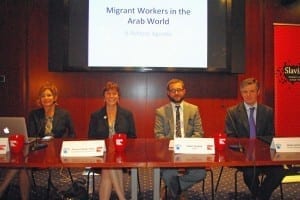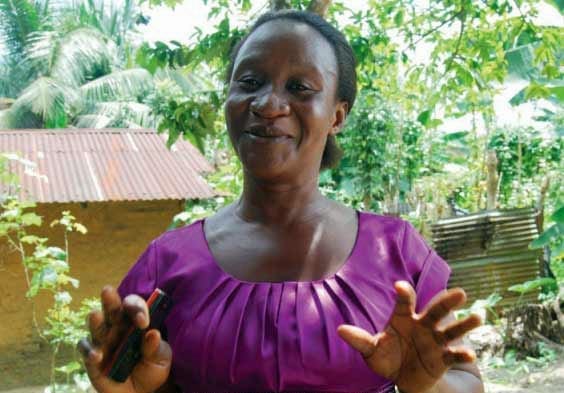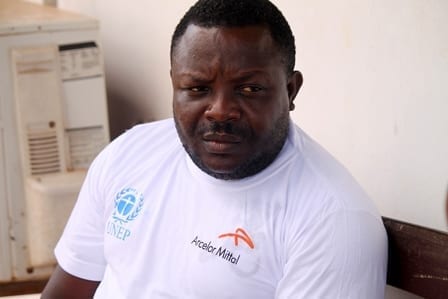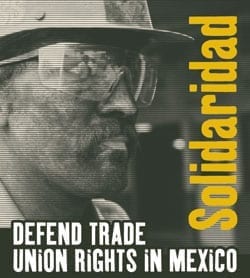Jul 11, 2014

HRW’s Sarah Leah Whitson, Solidarity Center Executive Director Shawna Bader-Blau, James Suzano of ADHRB and James Lynch at Amnesty International spoke at a Capitol Hill Briefing on migrant workers. Credit: Kate Conradt/Solidarity Center
Migrant workers to the Arabian Gulf states are rarely covered by labor law and generally denied the ability to exercise fundamental human rights, including freedom of association, which makes them vulnerable to exploitation and abuse, said panelists at a standing-room-only Capitol Hill briefing Tuesday.
Migrant workers to countries such as Bahrain, Kuwait and Qatar endure a “triangle of oppression,” in which they pay steep fees to get a job, generally have their passports taken by employers once they arrive in country and then find they have no legal protection or recourse when they are abused, said Sarah Leah Whitson, executive director for the Middle East and North Africa Division of Human Rights Watch.
Whitson, who described the migrant worker experience as “akin to indentured servitude,” was one of four panelists at a Capitol Hill briefing this week, “Modern Day Slavery: Combating Migrant Labor Abuses and Ending Human Trafficking in the Gulf.”
Sponsored by the Solidarity Center and the Americans for Democracy and Human Rights in Bahrain (ADHRB), the panel was moderated by Solidarity Center Executive Director Shawna Bader-Blau, who noted the importance of shining “a light on migrant exploitation in the Gulf as part of the broader global fight against human trafficking and forced labor.” Other panelists were James Suzano, ADHRB legal officer, and James Lynch, researcher at Amnesty International London.
The panel was the second of two Capitol Hill events on July 8 highlighting the plight of the 90 million migrants who cross borders every year to work. In the Middle East, some 18.6 million migrant workers toil at jobs such as construction and domestic work.
Panelists repeatedly pointed to the brutality of the employer sponsorship system in Gulf countries “which emboldens employers to mistreat workers,” said Suzano. Known as kafala, the system requires foreign workers to have an employer sponsor, prevents workers from changing jobs without employer approval or judicial authorization, and deports workers who seek new employment or flee abusive conditions. Although most Gulf countries recently have enacted laws to address the abuses inherent in kafala, panelists noted that these laws are not enforced.
Further, said Lynch, it is impossible to “understand the vested interests” that perpetuate employer sponsorship programs in Gulf countries and around the world. Employers benefit from a captive workforce who cannot negotiate for better pay and working conditions—or report abuse to authorities. And often, corruption in governments may mean officials are working with labor recruiters.
Middle Eastern governments refuse to grant citizenship to migrants who have made the country their home for many years, denying them fundamental rights such as the freedom to join unions, bargain collectively and strike, several panelists said. In most Gulf countries, migrant workers comprise the vast majority of the working population, toiling particularly in difficult jobs such as construction and domestic service, yet are not even guaranteed a minimum wage.
As elsewhere around the world, migrants in the region are trafficked for what often turns out to be forced labor. “Human trafficking is much more prevalent than sex trafficking and it needs to be more comprehensively addressed,” said Suzano.
“Ultimately, said Bader-Blau, “the problem of human trafficking in the Gulf is a problem of migrant worker exploitation, and that is a problem of global governance of migration and a problem fundamentally of worker rights and human rights.

Jul 5, 2014
In Nigeria’s oil-rich Niger Delta, where the nation’s vast oil revenue has not benefited working people, who typically are paid less than $2 per day, women and children are especially vulnerable.
Yet in the face of corruption, environmental degradation, gender discrimination and human rights abuses, a unique, women-led grassroots coalition is training and mobilizing women in urban and rural communities, empowering them to hold local lawmakers accountable and achieve concrete goals in their communities.
Women Initiative for Transparency and Social Justice (WITSOJ), a coalition of union and community groups, formed in 2007, inspired by a Solidarity Center workshop on women’s empowerment and civil-society participation in Warri, a major oil city in Delta State. Since then, WITSOJ has trained more than 5,000 women and young people in hands-on workshops.
“Because of the way the government has been running its affairs (local residents) think they should beg for health care services, schools, roads,” said Sarah Emmanuel-Apia, a lawyer and WITSOJ leader. “We show them the (Nigerian) constitution and the budget and (show them that) these things should come to them even without asking—and if they don’t get it they should come together to make their demands.”
Following one such WITSOJ training in 2011, hundreds of women from several communities marched to the local council building in Oyigbo, a town northeast of Port Harcourt, to demand a health care clinic. Local officials had ignored their requests for years, but empowered by WITSOJ, the women refused to be turned away. Ultimately, the government renovated the area’s dilapidated health clinic and also built a well-equipped health center at nearby Obuakpu.
“Maternal mortality is very high here,” said Emmanuel-Apia. “It’s normal here for women to die giving birth. If bringing the health center will help them live longer, we will support it.”
Emmanuel-Apia and others in WITSOJ are featured in a new Solidarity Center report, “Nigeria: Empowering Women, Transforming Society,” available in English and Spanish.
As a coalition of more than 20 local organizations, WITSOJ regularly taps into the expertise of its members, such as Women in PENGASSAN, the Petroleum and Natural Gas Senior Staff Association of Nigeria.
Ijeoma Dom-Nwachukwu, national chairwoman of Women in PENGASSAN, says the union partners with WITSOJ to fight for “the women who are marginalized in rural areas.
WITSOJ coordinator Dr. Jennifer Spiff says the union’s deep roots in local communities adds credibility to WITSOJ. “The partnership with the union “gives WITSOJ the leverage to be trusted as an organization owned by the masses,” she said.
“Working people see trade unions as representing the people, and believe that WITSOJ cannot be hijacked by politicians, since it has a union collaboration.” The coalition also includes the Nigeria Labor Congress (NLC) and the Trade Union Congress of Nigeria (TUC).
Through its outreach, “WITSOJ has made women realize the need for gender equality, and that most times, women can become as good ambassadors in leadership as their male counterparts,” said journalist Gold Minimah, an active WITSOJ member.
Victory Goodluck, a WITSOJ member and farmer from the Ihuike community in Ahoada East Local Government, points out that the organization’s strategy to focus on women works “because women are instruments of change.”
The report is part of Catalysts for Change, a Solidarity Center series highlighting the working people, their unions and activists who are advancing worker rights and greater equity in their societies.

Jul 1, 2014
Miners, forklift drivers and other workers at ArcelorMittal in Liberia are seeking to close the wage gap between residents and expatriate workers, who can receive up to 10 times the salary for the same work.
But contract negotiations between the United Workers Union of Liberia Local 4 and ArcelorMittal have stalled, with management refusing to agree to the wage increase the workers’ are seeking. Luxembourg-based ArcelorMittal is the world’s leading mining and steel company and has operated in Liberia since 2006. In 2013, the corporation saw $6.89 billion in profits.
Recently, Solidarity Center Africa Region Director Imani Countess talked with UWUL Local 4 Secretary General Amos Monweh, who discussed how the issues involved at the bargaining table reflect the country’s greater struggle to generate good jobs for Liberians while attracting overseas investment. Monweh has worked at ArcelorMittal for nine years and was elected secretary general in 2012. The following is an edited version of Amos Monweh’s remarks.
Workers at Arcellor Mittal are demanding a 70 percent increase in wages so that the highest paid national staff is equal to the least paid expatriate.
Why is this important? Arcellor Mittal is the global leader in steel production. In Liberia, they help set the standards in terms of industry practice.
In ArcelorMital facilities, non-technical staff, including hospital workers, security staff and key positions in management are filled by expatriates from South Africa, the United Kingdom and India, as well as a number of countries in Africa.
Salaries and benefits for expatriates vary significantly. Such variance create a serious mis-alignment with higher wages, allowances and benefits going to expatriates but not to nationals with similar skills. For example, an expatriate mine superintendent may make $10,000-$15,000 per month, while a national will make approximately $1,000. This 10-fold difference creates a discriminatory pattern, in which Liberians are on the losing side.
Further, expatriates often are not required to pay taxes on their salaries, which reduces revenue flow to the Liberian government.
Firms are required to establish skills development plans, including sending Liberians abroad for training if necessary.
(“Liberianization,” the transfer of skills to nationals with the goal of reducing reliance on expatriate labor, is a government requirement. The Investment Incentive Act of 2010, popularly known as the Liberianization policy, sets aside 16 businesses exclusively for Liberians.)
With the first five years of a concession agreement (to a multinational company), plans should be in place so that skills are transferred to nationals within that time frame. Yet, these skill development plans are never put in place.
The union position is: Obey the law, enforce the concession agreement, or bring in Liberians. We will all make less money, but will ensure salary alignment, enhance skills and increase the number of decent jobs for Liberian nationals.
Jun 3, 2014
One year after the General Autonomous Confederation for Algerian Workers (Confédération Générale Autonome des Travailleurs Algériens, CGATA), submitted a registration application to the government, the national federation of autonomous unions still is waiting for its application to be confirmed. According to Algerian law, CGATA should have been granted full legal status within 30 days.
The International Union of Food, Agricultural, Hotel, Restaurant, Catering, Tobacco and Allied Workers’ Associations (IUF) is campaigning in support of CGATA and calling for activists around the world to send a message to the Algerian Labor Minister and other government officials: Register CGATA without delay and stop violating the human rights of Algerian workers. The message is in French, followed by English.
“Workers in Algeria are stymied at every turn when they try to form independent unions and act collectively,” according to a recent Human Rights Watch report. “The government punishes peaceful protesters and strikers, including with retaliatory suspensions or dismissals from public service jobs, and arbitrarily arrests and prosecutes union activists on politically motivated charges.”
Take action now.
Jun 2, 2014
 Worker rights advocates have lots of tools available to them to help foster safe and healthy workplaces, family-supporting wages and social protections. One item in the toolbox is rule of law—and a recent Solidarity Center analysis of Mexican laws and policies through the lens of a key international standard offers an example of how to utilize legal instruments to make positive change.
Worker rights advocates have lots of tools available to them to help foster safe and healthy workplaces, family-supporting wages and social protections. One item in the toolbox is rule of law—and a recent Solidarity Center analysis of Mexican laws and policies through the lens of a key international standard offers an example of how to utilize legal instruments to make positive change.
The Solidarity Center examined Mexico’s Constitution, federal law, public policies and common law (court rulings) and compared them with the obligations the country agreed to in 1981 when it ratified the International Covenant on Economic, Social and Cultural Rights (ICESCR).
Adopted by the United Nations in 1966 and in force since 1976, the ICESCR is a binding document signed by nearly all (162) countries. The IESCR covers issues such as forced labor, child labor, gender, migration and obligations to combat and reduce unemployment. It also includes extensive rights around freedom of association and the right to strike. The Solidarity Center compared three ICESCR articles with Mexico’s laws and conducted interviews and research to determine the extent of the country’s compliance. (The report will be out this summer—watch the Solidarity Center website for its release.)
Among the findings:
• Mexico’s 2012 labor law reform, in line with its ICESCR obligation to put in place a national employment plan and reduce the number of workers forced to make a living in the informal economy, has not fulfilled its goal of increasing jobs in the formal economy nor reducing informal-sector employment and overall employment.
• Laws in Mexico do not effectively limit the hours domestic workers can legally labor as part of its ICESCR obligation to protect the country’s 2.3 million domestic workers. Rather, the laws establish the possibility of a 12-hour day with no right to overtime pay, a violation of the country’s international obligations.
• Mexico’s labor law includes provisions to improve job safety and health, in accordance with the ICESCR, but many problems remain. For instance, new mining regulations cover coal but not other forms of mining, and attempt to regulate, but do not outlaw, artisanal mining, where many fatalities occur. The Labor Ministry, with one of the smallest shares of the federal budget, has limited resources for workplace inspections and even for the proper training of inspectors.
Such an analysis provides a concrete springboard from which unions and other worker advocates can pursue worker rights. Countries that ratify the ICESCR are obliged to report on the extent of their compliance, which includes enforcement, not merely implementation, of their ICESCR obligations. As a binding document, the ICESCR provides worker advocates a legal tool for pursuing fundamental socioeconomic rights based in international human rights norms.
Last year, the ICESCR Optional Protocol went into effect, giving individuals in countries that ratify the protocol the ability to seek justice for violations of their economic, social and cultural rights. Fourteen countries have ratified the optional protocol, including El Salvador, Gabon, Mongolia and Uruguay. The Optional Protocol can provide a key mechanism for improving worker rights, and unions and other civil society groups are well placed to advocate for its passage.
As part of the UN’s Bill of Human Rights, the ICESCR points to economic rights as essential to the fulfillment of human potential. As former South African President Nelson Mandela stated: “There is at times a tendency to view civil liberties as distinct from socioeconomic rights….There can be no more forceful refutation of that false distinction than the manner in which President Roosevelt formulated the generic freedoms of democracy




